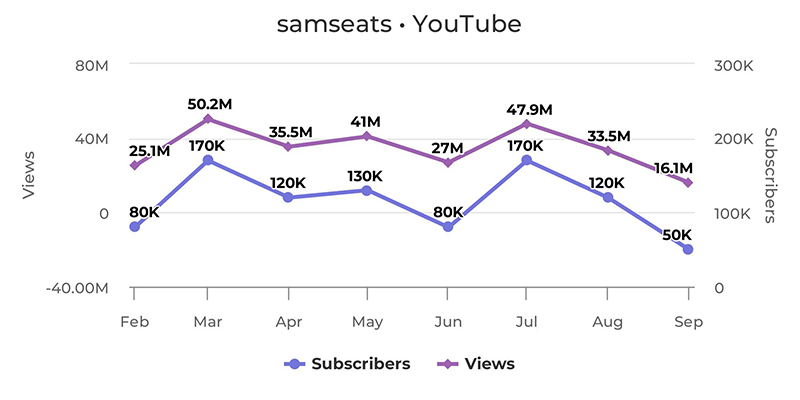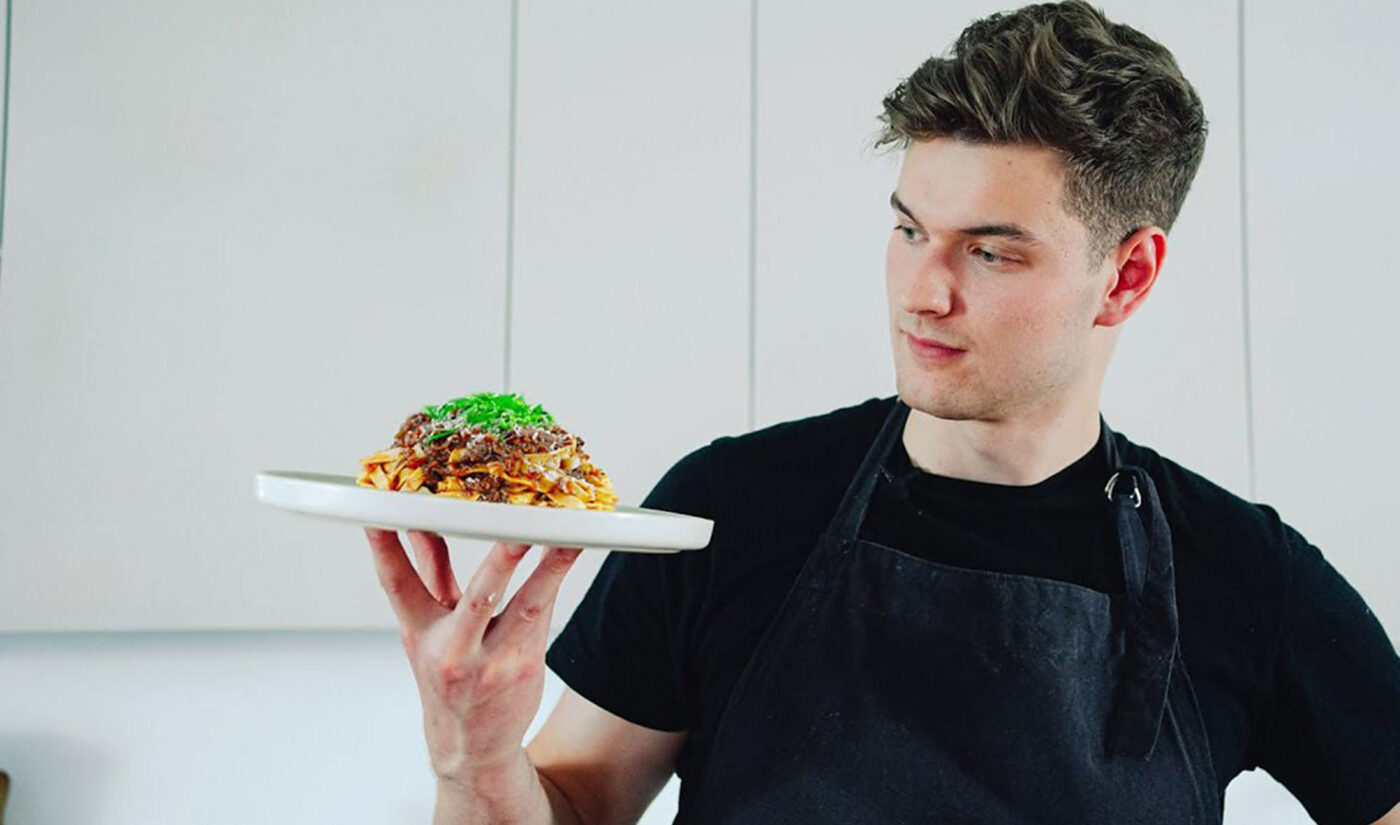Welcome to Creators on the Rise, where—in partnership with global creator company Jellysmack—we find and profile breakout creators who are in the midst of extraordinary growth.
When Sam Way joined YouTube and TikTok in 2021, he didn’t intend to become A Creator.
He just wanted to get a job.

Subscribe to get the latest creator news
Way grew up in a food-loving family, and by the time he was old enough to take over cooking meals for everyone, he knew food was a comfort for him. It was what he did to de-stress, to relax, to chill out. It was what he loved most.
That was why he didn’t want to turn it into a career. We’ve all heard that (inaccurate) saying that “If you have a job doing something you love, you’ll never work a day in your life.” Well, Way had heard something different: “If you work in something you love, sometimes it ruins it.” He didn’t want food ruined by the pressure of a professional environment. So, instead, he went through university and went into property in his home city, London.
And he hated it.
So, at the start of the pandemic, he quit.

Monthly view and subscriber counts from Gospel Stats.
While working that much-despised job, Way had slowly begun to come around to the idea that maybe food could be a career. After all, if he was going to do something 24/7, day in and day out, he wanted that something to be something he loved. Warmed to the idea of working in a kitchen or some kind of culinary startup, he set out to look for a new job.
But there was a problem. He didn’t have any formal training.
He’d seen digital portfolios work out for people like fashion designers. So, to prove his skills, he started recording short videos of himself making food and posting them on YouTube and TikTok.
Within three months, his videos were getting millions of views each, and Way knew things had moved beyond building a portfolio to find a new job. YouTube and TikTok had become that job.
Check out our chat with him below.
Tubefilter: Let’s start from the beginning! If somebody’s reading this and has never seen your content, doesn’t know who you are, can you tell us a little bit about where you’re from and how you ended up on YouTube?
Sam Way: So I’m Sam, I’m 23, and this whole social media side of things started as a kind of coincidence. I’ve been doing it now for a year and a half. It was Boxing Day 2020, when I posted my first video, and since then it’s kind of gone crazy.
A bit of background about how I got into it: I actually wanted to join a restaurant, work at a restaurant, or I wanted to join food or drink startup. I had just left a job I really disliked; I was working in property in the city and it just wasn’t for me. Then I was a bit like, “Okay, what am I gonna do now? I want to move into the restaurant world.”
I was a bit stuck on how, because I don’t have any professional training, and I didn’t really have any qualifications for that kind of stuff. It was also the second lockdown for COVID, so people were losing their jobs, places were closing. So I was like, “This is gonna be hard.”
I really decided to just build like a portfolio, build a CV. You have them in lots of the creative pursuits, for example, like fashion, design, all that kind of stuff. You have digital portfolios—you tend to have that. So I was like, “How can I show my cooking in a portfolio online?” So I literally just started doing these videos to build a little portfolio. I started to post on YouTube and other social media platforms and really just had that as my little passion project that I could show to employers rather than writing the same old, “I’ve loved cooking since I was young,” all that kind of stuff.
Since then it’s taken a very different turn. It was within a few weeks, I think, that some of my videos started getting tens of thousands of views, and then it shot up to hundreds of thousands. Then it’s the point where you get millions of views and you’re realizing that actually this is something that can be like a job, a career.
Since then, a couple months after starting, I went full-time, and that’s where I am now.
Tubefilter: Can you talk a little bit more about how you fell in love with food?
SW: For me, food was always like my hobby. It was my go-to if I wanted to destress, if I was unhappy or whatever. It was my relaxation. Some people like reading, other kinds of things, but for me, food was my way of just chilling out, having a fun time. You have that saying like, “If you work in something you love, sometimes it ruins it.” So I didn’t want to work in that industry to start with.
I haven’t found that to be the case so far, though. So far so good. But yeah, I think I had just put that off, and obviously I went through school and kind of never really thought about it. Until I was like, “Actually, what am I doing working a job I’m unhappy in?”
The only thing I want to be doing is something that makes me happy. And food and drink is the way to my heart, and always has been. So yes, since I was maybe early teens, I grew up in a family with a mom and dad who are great home cooks. That in itself is an inspiration for me to have gotten into the kitsch from a young age. We didn’t have takeout, takeaways, all that stuff. It was just kind of part of what I had growing up. I was surrounded by a lot of food people, people who love food. So my curiosity came through, I started to help in the kitchen, do more stuff myself, and then eventually taking over the meals and telling my dad to get out. [laughs]
I was also very sporty when I was younger, so I did a lot of athletic track and field, and at that age, it’s what I thought I was going to do for a career. I wanted to pursue that as a career. As a result, because I was so into sports, I was naturally also into food. It strengthened that love for food, because I was more interested in it, and I wanted to start making stuff myself, where I’d know where it comes from and more of the health side of it.
I think those things combined kind of led my interest where it is now. So, self-taught—no culinary school, just self-taught from books, TV, online, other people, family, all that stuff.
Tubefilter: Very cool.
SW: It was! It’s very kind of…I would’ve loved to have professional training. Still, maybe. I guess I can get that if I want to go do stuff with some professional cook, and that’s a great thing. I’ve got so much I can do to learn still. That’s where it’s really nice meeting people. I was in Mexico earlier this year and had the most amazing time with a chef out there.
Tubefilter: I know you said you started gathering an audience pretty quickly, but when did it become apparent to you that this could be a real thing? Was there a specific video that took off?
SW: I think I was quite lucky in that sense. I’ve obviously had videos which have been more popular than others. I think that naturally happens. But I was pretty lucky in the sense that maybe after my third video or something, I was getting a lot of views, and it started snowballing, bit by bit. The videos just started getting more and more views.
I’ve done a few videos that really boosted my followings. I did a video of ratatouille, which always goes down well. It was one from the Disney film, and then I did Belgium moules frites, which is a Belgian mussels and fries dish. That was a great success as well. I went out and caught mussels and all that kind of stuff, and people seemed to love it.
But aside from those, I’m pretty lucky in the sense that my videos are always well received, which I’m grateful for, because I know sometimes it comes on for one video and then it’s hard to get anything on any other videos. But yeah, I’ve gotten nicely lucky in that sense.
Tubefilter: When did this officially become a full-time job instead of a portfolio-builder? When was that mindset shift?
SW: I think maybe about three months after starting. I was very much still kind of looking for jobs, keeping my eyes out for things over those three months. But then by like February or March time is when my first brand deal came in. I think that’s when it was. When I was like, “Wow.” I didn’t realize brands would put money toward these things. I was not expecting any of that. So I was really grateful for that. Then I was lucky enough to keep getting brands and obviously you’re able to monetize on various platforms, which is quite handy. I started making just enough to get by, to keep living.
Tubefilter: You mentioned being able to go to Mexico and meet with a chef. What other cool opportunities have you had so far?
SW: I think the amazing thing about what I do is…it’s food! And as I said, wherever you travel, whoever you meet, there’s always a love language. A lot of people love food and you’re able to connect with someone through food. It’s so interesting, with lovely people, and other creators. But also when I was abroad, I met a lot with the locals. Really getting to meet a huge variety of people. I think that’s what I really benefit from the most.
I’ve got some travel and some opportunities to do things outside of social media coming next year, which I don’t think I can say anything about, but which is exciting. It’s opening doors as well; I guess having that presence on social media gives you the ability—and I’m very lucky to have that ability—to go and into a cafe or restaurant and strike up conversation with someone quickly. If they ask what you do, you explain, and then it’s very nice meeting people.
Tubefilter: What does the average day look like for you?
SW: It’s probably one of three things a day. I will either be planning, a day of planning, and that takes a long time. I like to do things true to how they are: if it’s an authentic dish somewhere else, I spend time researching, doing my best effort to find out a lot of detail about it. Then obviously getting ingredients, sourcing them. Especially if it’s quite a niche thing to find, I’ll have to go halfway across London to find it. But yeah, planning is one day.
Another day would be filming. Filming can take a lot of time. A dish might take an hour to cook, but filming quadruples that amount of time. It might take four or five hours just because of having to get shots, having to be conscious of all those kind of things.
Then editing is the interesting thing which I think people kind of forget that goes into these videos. You see them and go, “Oh, that’s amazing.” But then people kind forget you spend a good…probably more time editing than actually filming, really. Editing is the big task, it’s the big thing, but I enjoy it and I have a nice setup for editing. I just get comfortable, sit down, and get coffee, and I’m good to go.
Tubefilter: Have you thought about hiring in editors or is it just important to you to be able to do it yourself?
SW: I have. I think there’s certain situations where I would use an editor. I have done, with slower videos, like tutorial-based videos, I’ve done bits myself and then bits of outsourcing the editing. But at the moment, with YouTube long and short and all other kinds of content, it’s me.
Tubefilter: Can you walk us through a little bit about how you come up with a recipe for a video? Do you test a recipe beforehand? How do you come up with your ideas?
SW: Coming up with ideas, sometimes I’ve been inspired by something I’ve eaten out, or something I’ve seen on TV, or I’ve seen on social media. That’s one form of inspiration for videos. The second thing is I will kind of ask people what they want see me make. Another way is, I base a lot of my food off quite popular dishes. I am doing more niche dishes, but I like to do dishes people know. So moules frites is a classic one, the ratatouille one, or burger or a nice pasta alfredo, something like that. Things people know. Then sometimes I’m craving something and I want to do a video on it and I’ll just do it.
So I get inspiration and ideas from everywhere, really. Something can just pop into my head in bed or in the shower or something and I just get it down and do it. And then testing, that’s a big part of what I’m doing. I think it comes down to if it’s something that is out of my comfort zone or something that I’m not too familiar with, I will have to test it because I want to just make sure it’s right before I do a recipe and I put up a video.
But then a big part of it is, I guess a lot of stuff I like to cook is stuff I’ve done before or stuff I know will work. So I will do that, and whilst filming I might adjust the recipe here and there. I very much might build the recipe as I’m going. I’ll have an idea of what I’m doing, and then I will adjust it and build it. That’s the testing process as well.
Tubefilter: You’ve gathered 2.2 million subscribers in a year and a half, which is no small feat. How has it felt to gather that large of an audience that quickly?
SW: It’s kind of crazy. I grew up watching a lot of YouTube, just like the classic Casey Neistat and all that stuff. I grew up watching those YouTube videos. I’m more of like a Shorts career on YouTube, but I’m increasingly moreso doing long content and making that priority, because I think people really find it…It’s just a whole different viewer experience.
But in terms of growth, I feel like it’s just time, place, and luck. Obviously I’m doing something people like, and I think all of those combined kind of put me in that good position to upgrade so quickly. There’s a few other people who have benefited off all those things as well. We’re all in such an amazing position. I’m very grateful for it.
Tubefilter: I wanted to ask about that! I’ve spoken to a lot of culinary creators. Lisa Nguyen was one of the first people I interviewed for this column. Do you have anybody you want to call out as being a sort of culinary comrade-in-arms?
SW: I tell you what, I’m not gonna call people out and say names and then regret not saying someone. [laughs]
Tubefilter: Ahh, understandable.
SW: It’s a really nice community, the food community. It’s healthy competition. I don’t think there’s anyone who’s like aggressively rude or stuff like that. I think food, as I said, is something that people can really do together and get behind no matter where you’re from. I’m in London, and there’s a lot of us from Europe, and it’s a mix of people that’s good. It’s nice to see new people pop up. Everyone’s making the most of the wave.
Jellysmack is the global creator company that powers multi-platform social media growth for video creators, media companies, brands, celebrities, and its own online communities (Beauty Studio, Oh My Goal, Gamology, House of Bounce and more). The company’s proprietary technology optimizes, distributes, and promotes video content, resulting in meaningful audience growth and increased revenue in record time. Jellysmack is currently partnered with hundreds of talented creators including MrBeast, PewDiePie, Like Nastya, and Bailey Sarian. Looking to Go Bigger on social? Visit jellysmack.com.








